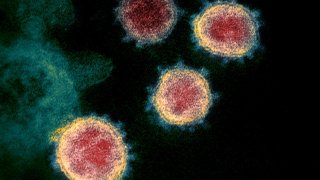
A San Diego-based research group announced Tuesday that the director of its immunity and pathogenesis program has been awarded a $10.2 million, four-year grant from the Pentagon to develop antiviral drugs to treat respiratory diseases.
The team led by Sumit Chanda, Ph.D., at Sanford Burnham Prebys Medical Discovery Institute will look to develop antiviral drugs to combat a wide variety of illnesses, rather than a "one-bug-one-drug" solution, where antivirals target a single virus.
Researchers will look into four "preclinical drug-like small molecules that exhibit broad-spectrum activity" for their potential to treat viruses, including whether they can be optimized and deployed to address COVID-19, officials said.
A primary aim of the grant is to help U.S. military personnel, as respiratory viruses represent the most commonly diagnosed medical conditions among military recruits and trainees, according to Sanford Burnham Prebys.
"We want to move away from the 'one-bug-one-drug' paradigm and develop drug candidates that are effective against multiple respiratory viruses," Chanda said.
"While respiratory diseases caused by bacteria are relatively simple to treat with broad-spectrum antibiotics, we don't have the same type of medications available for viral respiratory infections. Broad-spectrum respiratory antiviral drugs could greatly benefit military personnel in settings where point-of-care diagnostics are not available, as well as when a virus seemingly comes out of nowhere, like SARS-CoV-2 did.''
Adolfo Garcia-Sastre, Ph.D., a microbiology professor collaborating on the project, said the group anticipates that "these respiratory antivirals could treat infections caused by viruses including influenza A and B, human rhinoviruses, respiratory syncytial virus, adenoviruses -- and importantly -- coronaviruses."
Local
"Our collective experience in researching the molecular biology of viruses will lead to new approaches to combat deadly respiratory viruses that affect millions of people and lay the groundwork for protecting us against viruses yet unknown."
While current strategies involve targeting viral proteins, Chanda said his team's antivirals will target host -- or human -- proteins, which viruses "hijack" to copy themselves and spread throughout the body.
"If we can protect the features in our cells that viruses depend on for their life cycle, we can prevent their replication and spread. Since different respiratory viruses take advantage of the same host functions, one drug could be effective against many viruses," Chanda said.



